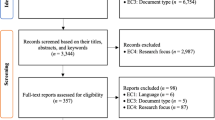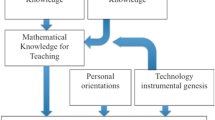Abstract
This study is based on our belief that mathematics should be challenging in any classroom and that mathematical challenge is among the central factors that determine the quality of mathematics lessons. Choosing challenging mathematical problem for the students is central in teachers’ work while their conception of mathematical challenge can determine the quality of a mathematics lesson. At the same time, little is known about teachers’ views on mathematical challenge. Thus, we explored conceptions of mathematical challenge in two groups of experienced mathematics teachers. The first group (N1 = 9) was asked to define the notion of mathematical challenge and give examples of challenging mathematical tasks. Later the members of the group discussed these examples and definitions. A written response questionnaire was administered to a second group of teachers (N2 = 41) based on answers given by teachers in the first group. We found that the teachers have a broad conception of mathematical challenge and appreciate the relativity of mathematical challenge but are not always convinced that it is possible to incorporate challenging mathematics in everyday teaching in the classroom.
Résumé
Cette étude se fonde sur notre conviction que les mathématiques doivent présenter des défis intéressants dans tout cours et que le défi mathématique est l’un des facteurs principaux qui déterminent la qualité des cours de mathématiques. Le choix de problèmes mathématiques qui présentent un défi intéressant pour les étudiants est fondamental dans le travail des enseignants, et leur conception des défis mathématiques est susceptible de déterminer la qualité de leurs leçons. Cependant, on sait peu de choses sur les points de vue des enseignants en ce qui concerne les défis mathématiques. Nous avons donc analysé la conception des défis en mathématiques chez deux groupes d’enseignants d’expérience. Au premier groupe (N1 = 9), nous avons demandé de définir la notion de défi mathématique et de donner des exemples de tâches mathématiques présentant un défi. Plus tard, les membres du groupe ont participé à une discussion sur ces exemples et définitions. Un questionnaire écrit basé sur les réponses fournies par les enseignants du premier groupe a ensuite été administré à un deuxième groupe d’enseignants (N2 = 41). Nos résultats indiquent que les enseignants ont une conception assez large de ce qui constitue un défi mathématique et qu’ils en apprécient la relativité, mais qu’ils ne sont pas toujours convaincus qu’il soit possible d’incorporer ces défis dans leur enseignement au quotidien.
Similar content being viewed by others
References
Ball, D. L., Hill, H. C., & Bass, H. (2005). Knowing mathematics for teaching: Who knows mathematics well enough to teach third grade, and how can we decide? American Educator, 29(1), 12–22.
Barbeau, E., & Taylor, P. (Eds.). (2009). ICMI Study—16 Volume: Mathematical challenge in and beyond the classroom. Dordrecht, the Netherlands: Kluwer.
Brousseau, G. (1997). Theory of didactical situations in mathematics. Dordrecht, the Netherlands: Kluwer.
Brown, S. I., & Walter, M. I. (1983). The art of problem posing. Hillsdale, NJ: Lawrence Erlbaum.
Cambridge Dictionaries Online. (2014). Challenge. Retrieved from https://doi.org/dictionary.cambridge.org/dictionary/british/challenge
Charles, R., & Lester, F. (1982). Teaching problem solving: What, why and how. Palo Alto, CA: Dale Seymour.
Choppin, J. (2011). The role of local theories: Teachers knowledge and its impact on engaging students with challenging tasks. Mathematics Education Research Journal, 23(1), 5–25.
Da Ponte, J. P., & Chapman, O. (2006). Mathematics teachers’ knowledge and practices. In A. Gutiérrez & P. Boero (Eds.), Handbook of research on the psychology of mathematics education: Past present and future (pp. 461–494). Rotterdam, the Netherlands: Sense Publishers.
Davydov, V. V. (1996). Theory of developing education. Moscow, Russia: Intor.
Hill, H., Rowan, B., & Ball, D. L. (2005). Effects of teachers’ mathematics knowledge for teaching on student achievement. American Educational Research Journal, 42, 371–406.
House, P. A., & Coxford, A.F. (1995). Connecting mathematics across the curriculum: 1995 Yearbook. Reston, VA: National Council of the Teachers of Mathematics.
Jaworski, B. (1992). Mathematics teaching: What is it? For the Learning of Mathematics, 12, 8–14.
Jaworski, B. (1994). Investigating mathematics teaching: A constructivist inquiry. London, England: Falmer.
Kennedy, M. M. (2002). Knowledge and teaching. Teacher and Teaching: Theory and Practice, 8, 355–370.
Krainer, K. (2001). Teachers’ growth is more than the growth of individual teachers: The case of Gisela. In F.-L. Lin & T. J. Cooney (Eds.), Making sense of mathematics teacher education (pp. 271–293). Dordrecht, the Netherlands: Kluwer Academic Publishers.
Krutetskii, V. A. (1976). The psychology of mathematical abilities in schoolchildren (J. Teller, Trans., J. Kilpatrick & I. Wirszup, Eds.). Chicago, IL: The University of Chicago Press.
Leikin, R. (2004). Towards high quality geometrical tasks: Reformulation of a proof problem. In M. J. Hoines & A. B. Fuglestad (Eds.), Proceedings of the 28th International Conference for the Psychology of Mathematics Education (Vol. 3, pp. 209–216). Bergen, Norway: Bergen University College.
Leikin, R. (2007). Habits of mind associated with advanced mathematical thinking and solution spaces of mathematical tasks. In D. Pitta-Pantazi & G. Philippou (Eds.), The proceedings of the Fifth Conference of the European Society for Research in Mathematics Education–CERME-5 (pp. 2330–2339). Larnaca, Cyprus: University of Cyprus.
Leikin, R. (2014). Challenging mathematics with multiple solution tasks and mathematical investigations in geometry. In Y. Li, E. A. Silver, & edS. Li (Eds.), Transforming mathematics instruction: Multiple approaches and practices. (pp. 59–80). Dordrecht, the Netherlands: Springer.
Leikin, R., & Levav-Waynberg, A. (2007). Exploring mathematics teacher knowledge to explain the gap between theory-based recommendations and school practice in the use of connecting tasks. Educational Studies in Mathematics, 66, 349–371.
Leontyev, A. N. (1978). Activity, consciousness, and personality. Englewood Cliffs, NJ: Prentice-Hall.
Polya, G. (1973). How to solve it. A new aspect of mathematical method. Princeton, NJ: Princeton University Press.
Schoenfeld, A. H. (1985). Mathematical problem solving. Orlando, FL: Academic Press.
Shulman, L. S. (1986). Those who understand: Knowing growth in teaching. Educational Researcher, 5, 4–14.
Simon, A. M. (1997). Developing new models of mathematics teaching: An imperative for research on mathematics teacher development. In E. Fennema & B. Scott-Nelson (Eds.), Mathematics teachers in transition (pp. 55–86). Mahwah, NJ: Erlbaum.
Steinbring, H. (1998). Elements of epistemological knowledge for mathematics teachers. Journal of Mathematics Teacher Education, 1(2), 157–189.
Sutton, S. (2012). The Newton’s window great math challenges. Retrieved from https://doi.org/www.suzannesutton.com/summermath.htm
Taylor, P. (2006). Challenging mathematics and its role in the learning process. In ICMI Study 16: Challenging mathematics in and beyond the classroom. Trondheim, Norway. Retrieved May 2007 from https://doi.org/www.amt.edu.au/icmis16ptaylor.pdf
Thompson, A. (1992). Teachers’ beliefs and conceptions: A synthesis of the research. In D. A. Grouws (Ed.), Handbook for research on mathematics teaching and learning (pp. 127–146). New York, NY: Macmillan.
Verschaffel, L., & De Corte, E. (1997). Teaching realistic mathematical modelling in the elementary school. A teaching experiment with fifth graders. Journal for Research in Mathematics Education, 28, 577–601.
Vygotsky, L.S. (1978). Mind in society: The development of higher psychological processes. Cambridge, MA: Harvard University Press.
Watson, A., & Mason, J. (2005). Mathematics as a constructive activity: Learners generating examples. Mahwah, NJ: Lawrence Erlbaum.
Zazkis, R., & Leikin, R. (2007). Generating examples: From pedagogical tool to a research tool. For the Learning of Mathematics, 27, 11–17.
Zazkis, R., & Leikin, R. (2008). Exemplifying definitions: Example generation for the analysis of mathematics knowledge. Educational Studies in Mathematics, 69, 131–148.
Author information
Authors and Affiliations
Corresponding author
Rights and permissions
About this article
Cite this article
Applebaum, M., Leikin, R. Mathematical Challenge in the Eyes of the Beholder: Mathematics Teachers’ Views. Can J Sci Math Techn 14, 388–403 (2014). https://doi.org/10.1080/14926156.2014.958624
Published:
Issue Date:
DOI: https://doi.org/10.1080/14926156.2014.958624




